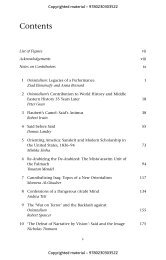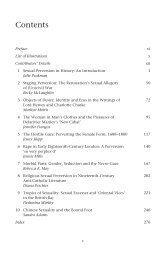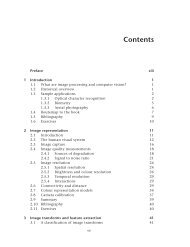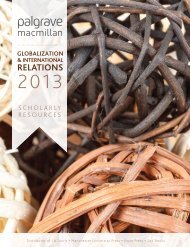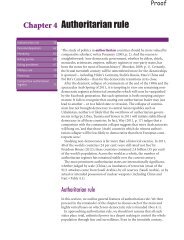The Nameless Shamelessness of Ulysses - Palgrave
The Nameless Shamelessness of Ulysses - Palgrave
The Nameless Shamelessness of Ulysses - Palgrave
You also want an ePaper? Increase the reach of your titles
YUMPU automatically turns print PDFs into web optimized ePapers that Google loves.
<strong>The</strong> ‘nameless shamelessness’ <strong>of</strong> <strong>Ulysses</strong> 31<br />
him, the description ‘could be taken as <strong>of</strong>fensive to the late King’. 16 This<br />
is certainly not the kind <strong>of</strong> legal difficulty we most <strong>of</strong>ten associate with<br />
Joyce’s work and to a modern reader the potential threat <strong>of</strong> this passage has<br />
become essentially illegible. Nevertheless, the menace <strong>of</strong> libel hung precipitously<br />
over Dubliners throughout the negotiations with Maunsel, as the firm’s<br />
solicitors grew ever more concerned about the absence <strong>of</strong> those decorous<br />
dashes Kenner describes. <strong>The</strong> genuine threat <strong>of</strong> a libel suit in this case was<br />
likely to be quite small and Joyce, in an effort to dispel Roberts’s concerns,<br />
actually wrote a letter to George V explaining his situation and asking that<br />
the monarch ‘inform me whether in his view the passage (certain allusions<br />
made by a person <strong>of</strong> the story in the idiom <strong>of</strong> his social class) should be<br />
withheld from publication as <strong>of</strong>fensive to the memory <strong>of</strong> his father’. 17 Not<br />
surprisingly, the king’s secretary refused to <strong>of</strong>fer an opinion in the case,<br />
leaving Joyce with few options, as a book that once ran foul <strong>of</strong> obscenity<br />
laws now foundered on the threat <strong>of</strong> a libel suit.<br />
Joyce, <strong>of</strong> course, was apoplectic and wrote an open letter to the press<br />
decrying ‘the present condition <strong>of</strong> authorship in England and Ireland’ while<br />
citing specifically the passage Roberts wanted to change. 18 As the letter notes,<br />
Grant Richards had not raised any objections to the description <strong>of</strong> the king<br />
in 1906 and by publishing the passage itself in the paper, Joyce clearly<br />
hoped to allay any concerns about its legal status. Sinn Féin, in which the<br />
letter appeared, did print the passage, though the Northern Whig – a far less<br />
nationalist paper – declined to do so, no doubt because its editor too was<br />
concerned about his potential liability. Joyce himself probably did not realize<br />
that following the passage <strong>of</strong> the Newspaper Libel and Registration Act in<br />
1881, periodicals had a far greater licence to publish such material, since<br />
they were merely reporting news rather than themselves making libellous<br />
claims. <strong>The</strong> situation for Richards, however, was far more delicate since libel<br />
law in both Great Britain and Ireland allowed for the possibility <strong>of</strong> civil suits<br />
and even criminal prosecution for author, publisher and printer alike. As<br />
Francis Holt’s influential 1812 study, <strong>The</strong> Law <strong>of</strong> Libel, notes, ‘<strong>The</strong> <strong>of</strong>fence<br />
<strong>of</strong> libel and slander is proportionately more criminal as it presumes to reach<br />
persons to whom special veneration is due. <strong>The</strong> diminution <strong>of</strong> their credit<br />
is a public mischief, and the state itself suffers in their becoming the objects<br />
<strong>of</strong> scorn; not only themselves are vilified and degraded, but the great affairs<br />
which they conduct are obstructed, and the justice they administer is thereby<br />
disparaged.’ 19 It seems unlikely that by 1911 the Crown would undertake<br />
the prosecution <strong>of</strong> such a libel case, but Ellmann suggests rather vaguely<br />
that some kind <strong>of</strong> informal pressure may nevertheless have been brought to<br />
bear upon the firm by Lady Aberdeen, the Lord Lieutenant’s wife. 20 In fact,<br />
at a stormy 1912 meeting in Dublin, Roberts demanded that all mentions<br />
<strong>of</strong> the king be deleted from the collection. Joyce immediately consulted a<br />
solicitor, George Lidwell, who obligingly wrote to Roberts, carefully reserving<br />
judgement on the question <strong>of</strong> obscenity, while effectively minimizing the



